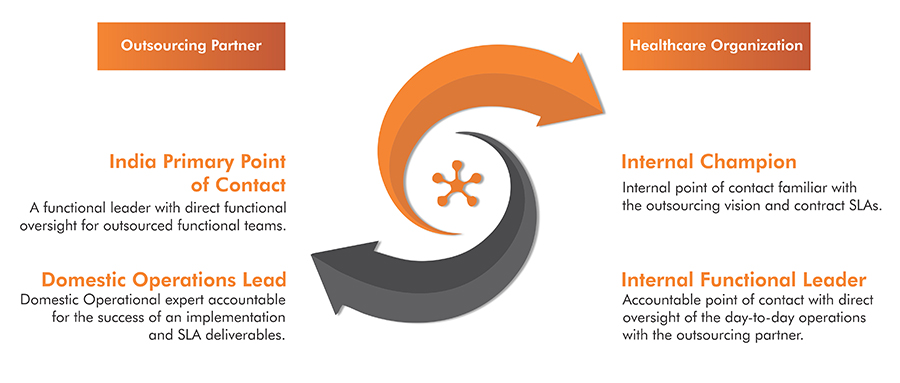There is increasing pressure to enhance healthcare innovation, as well as increase the migration of functional services offshore. Historically, healthcare delivery organizations used offshore partners to manage non-core activities. Today, the recent migration of outsourcing has expanded to more knowledge-based functions such as data analytics, disease risk stratification, machine learning, and CDI analysis. India has experienced extraordinary growth in global outsourcing market share due to the 2.2 million, highly educated STEM graduates entering the workforce annually and the 24-hour functional services coverage.
Outsourcing is a joint venture between a healthcare delivery organization and a vendor partner, and a misalignment of core activities during the implementation phase can lead to systemic failures down the road. Failure to effectively communicate and consult with internal staff about the impacts and mission in outsourcing could threaten the overall success of the outsourcing partnership, and can risk increased time and money losses due to poor collaboration.
Selecting a Trusted India Outsourcing Partner
High-performing healthcare organizations with overseas vendor partners have shown consulting with internal staff prior to outsourcing can build staff trust. It also translates into cost reduction by way of effective relationship management, and employee acceptance of an offshore partner. Successful partnerships with India require joint efforts at all functional levels, using a hybrid model of India offshoring. This should be augmented by domestic U.S. operational support, facilitating organizational benefits earlier in the partnership.
Have an open dialogue with your future outsourcing partner about the phased implementation plan with guidelines to communicate the decision to outsource, as well as any known systemic issues that may not be inherently visible. Avoid keeping outsourcing a secret at all costs; it is up to the leadership team and outsourcing partner to address the natural resistance to change or uncertainty with internal functional teams.
Be Strategic and Listen to Staff Perspectives
Healthcare organizations should create a culture of treating their internal teams as valuable assets before entering into an outsourcing partnership. Failure to do so exacerbates employee issues and could yield a false narrative that can be difficult to control. This also creates challenges for both the outsourced partner and internal leadership, which may result in decreased staff productivity, amplified attrition, and poor communication/business rhythm.
India is globally considered the premier outsourcing location and has vast experience in working with healthcare organizations throughout the outsourcing cycle. Maintaining direct communication between domestic and Indian counterparts can distinguish a partnership’s success and/or avoid potential risks, including deal failure.
Using the Domestic and India Resources Provided
Well established Indian outsourcing companies will provide domestic operational support with experience in predicting staff reactions and challenges in advance of the outsourcing roll-out. When drafting the outsourcing strategy, use the provided domestic consulting that high-performing outsourcing companies offer to address the technical, political, and cultural implications that could present during implementation. Outsourcing could be controversial; managing the dialogue and giving employees an emotional and tangible voice prevents the appearance of loss of control and risk of attrition.
When I personally visit hospitals that have elected to outsource to India, I try to overcommunicate the overall strategy and emphasize the internal time and cost benefits for the individual employee. Employees at all levels present the same two questions during their first outsourcing experience: 1) what will happen to my role? and 2) how does this affect me? This is the time to keep the answers clear and simple. Complicated strategy discussions can be overwhelming and deter employees from embracing the partnership. However, glossing over the obvious concerns and objections to outsourcing (e.g., loss of jobs, re-provisioning, patient/provider impact, quality, etc.) creates doubt and facilitates mistrust.

Overcoming Resistance to Change
Success at each level of the outsourcing implementation process decreases the inherent resistance at the next level. By arming staff with new skills, protocols, and experiences, they will gain the confidence to overcome their resistance to change. Learning new skills and processes used in the outsourced environment can be a source of professional development, specifically with change competencies. Willingness to participate and embrace outsourcing comes from involvement, which is the duty of the change management leaders within an organization.

